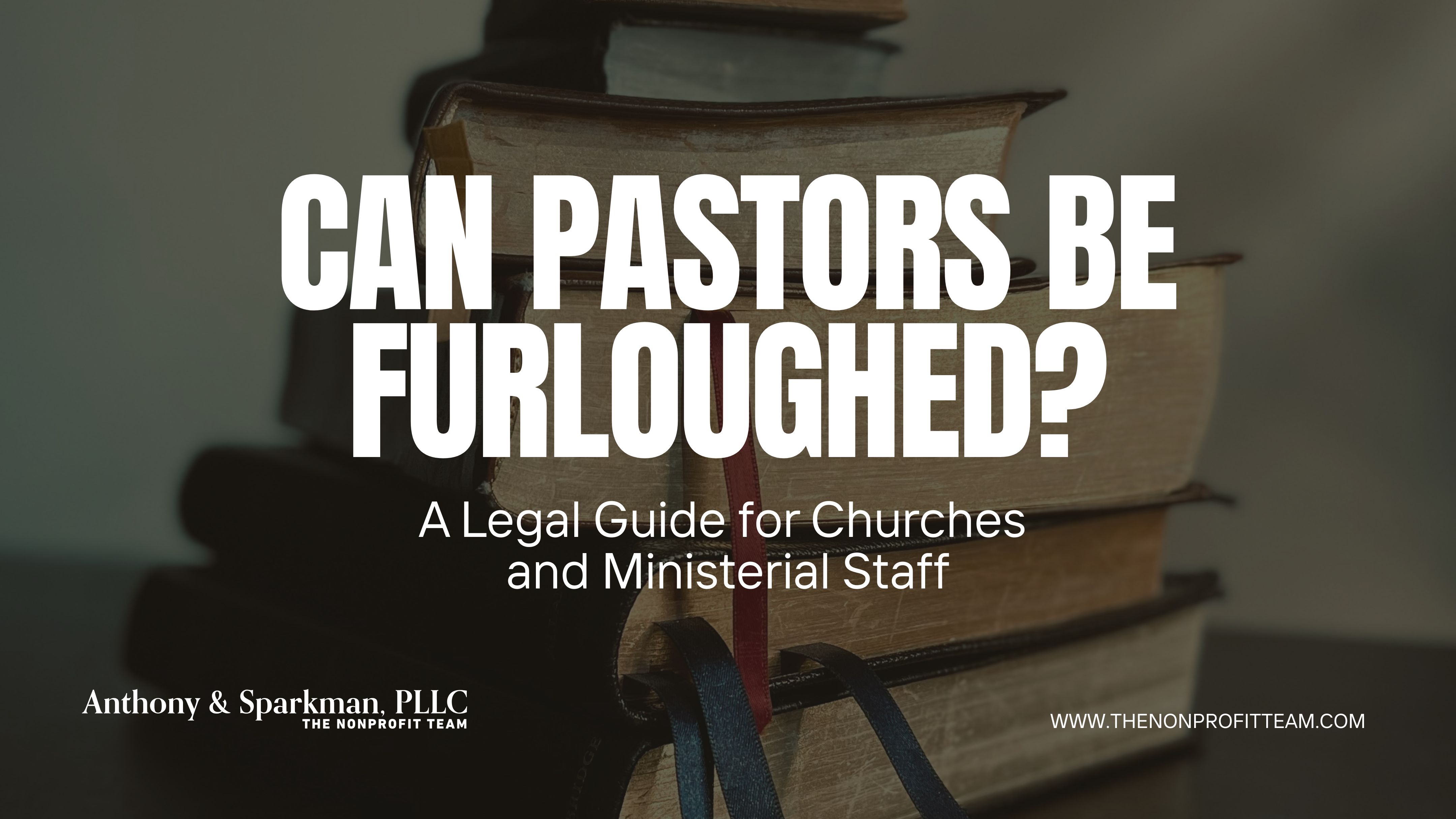
Can Pastors Be Furloughed? A Legal Guide for Churches and Ministerial Staff
When churches face financial shortfalls, furloughs are often one of the tools discussed to reduce expenses. But what happens when the employees in question are pastors or other ministerial staff? The answer is not as straightforward as it may be with lay employees.
Unique legal factors come into play when clergy are placed on furlough, and church boards must navigate this sensitive issue with both wisdom and compliance.
The Ministerial Exception
Based on the freedom of religion clauses of the First Amendment to the US Constitution, the ecclesiastical abstention doctrine prohibits the government from intruding into religious or spiritual decisions within a religious organization.
The ministerial exception generally prevents the application of federal and state employment statutes to clergy roles. That means labor and wage rules that apply to non-ministerial employees, such as overtime, unemployment eligibility, or certain termination protections, generally do not apply to clergy.
For church boards, this exception provides flexibility. But it also places greater responsibility on the ministry itself to set policies and procedures that are legally sound, financially prudent, and pastorally sensitive.
Can You Furlough Clergy?
The short answer is yes, ministries can furlough pastors. But the process is not dictated by state or federal labor law in the same way it is for non-ministerial staff. Instead, it depends on:
- Contracts or employment agreements: If a pastor has a written contract, furloughs must align with its terms.
- Church governance documents: Bylaws and denominational guidelines may outline how pastoral compensation can be adjusted.
- Board decisions: In many cases, the governing body of the church must approve changes to ministerial pay.
This flexibility does not mean churches should act casually. Clergy furloughs must be carefully documented and communicated.
Compensation and Benefits Considerations
For pastors, compensation is not always as simple as a salary line item. Several unique elements come into play:
- Housing allowance: If the salary is suspended or reduced, the housing allowance designation may need to be amended. Mishandling this can create IRS issues.
- Health benefits: Churches must decide whether to continue paying premiums during furlough. For clergy, this can be both a financial and pastoral decision.
- Retirement contributions: Contributions to 403(b) or denominational pension plans typically stop during unpaid periods unless the church chooses to continue them.
Each of these requires board action and clear documentation to avoid unintended tax or compliance problems.
Legal and Practical Safeguards
Even though the ministerial exception gives churches significant freedom, a few safeguards are essential:
- Document all decisions through board minutes.
- Seek legal review of furlough agreements or amendments.
- Apply decisions consistently to avoid claims of unfair treatment.
- Ensure compliance with IRS regulations for housing allowance, benefits, and retirement.
A little upfront diligence can prevent costly mistakes later.
Furloughing ministerial staff is not impossible, but it is complex. Churches must navigate the unique protections of the ministerial exception, the intricacies of clergy compensation, and the pastoral sensitivity such a decision requires.
Handled with care, furloughs can help a ministry weather financial storms while preserving trust and mission integrity. Handled poorly, they can create legal and relational challenges that linger long after the financial crisis has passed.
If your church is considering a furlough for pastoral staff, it’s wise to review your policies and seek legal guidance before moving forward. If your organization does not have trusted legal counsel to help guide you through this time, please reach out to us.
Ministerial Furlough FAQ
Can Churches Furlough Pastors and Ministerial Staff?
Yes, but the process is governed more by church contracts, bylaws, and board decisions than by state or federal labor law.
Do housing allowances stop during a furlough?
If salary is paused or reduced, the housing allowance designation may also need to be adjusted. Churches should pass a new board resolution to avoid IRS complications.
Will furloughed pastors qualify for unemployment benefits?
Generally no. Because of the ministerial exception, clergy are usually excluded from unemployment insurance programs.
What about health insurance?
The church decides whether to continue paying premiums during a furlough. Many boards view health coverage as a pastoral care issue as much as a financial one.
Do retirement contributions continue?
Not automatically. Contributions to 403(b) or denominational pension plans usually stop when salary is not being paid, unless the board authorizes ongoing contributions.
Is a furlough the same as a sabbatical?
No. A sabbatical is a planned season of rest or study, often with pay. A furlough is a cost-saving measure that usually suspends pay. Some churches may frame furlough time in a sabbatical-like way, but they are legally and practically different.
How should a board communicate a pastoral furlough?
With clarity, documentation, and pastoral sensitivity.
The information provided in this article does not, and is not intended to, constitute legal advice or investment advice; instead, all information, content, and materials available in this article are for general informational purposes only. The information contained in this article may not constitute the most up-to-date legal or other information. This article contains links to other third-party websites. Such links are only for the convenience of the reader, user, or browser; the author does not recommend or endorse the contents of the third-party sites.
Readers of this article should contact their attorney to obtain advice with respect to any particular legal matter.
Anthony & Sparkman, PLLC is a law firm with attorneys located in both Dallas/Fort Worth and Kalispell, Montana, that provides legal counsel to both churches and nonprofits around the world. John Anthony & Michele Sparkman have spent over a decade providing general counsel to churches and nonprofits on issues ranging from incorporation, governance, employment, policies and procedures, taxes, succession planning, real estate development, and much more. For more information, visit our website at www.thenonprofitteam.com.




